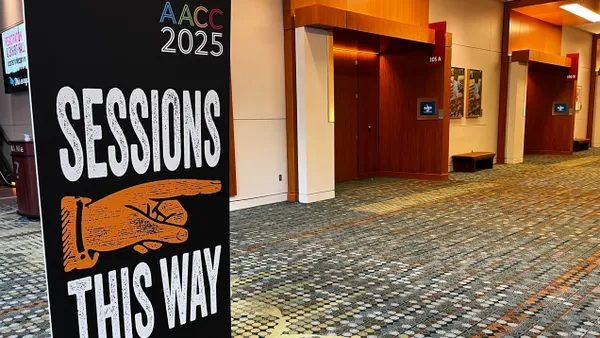Dive Brief:
- Stopped-out college students expressed confidence that they have the skills to return to higher education — but concerns over the cost, according to a new survey from UPCEA and online education company StraighterLine.
- A large share of the roughly 1,000 respondents, 88%, said they had basic academic skills needed for college, such as math and critical thinking. And 86% said they could competently use technology for research and coursework.
- But a majority of students, 58%, also said they could not afford tuition and education expenses with their current financial situation.
Dive Insight:
Facing the rapidly approaching demographic cliff — an expected dropoff in high school graduates starting around 2025 — many colleges are pivoting to reengaging students who attended college but left before earning a credential. Officials see significant enrollment potential among this group, as the nationwide pool of stopped-out students is large and growing.
By July 2022, 36.8 million adults under age 65 had some college but no credential, up 2.9% from the previous year, according to the National Student Clearinghouse Research Center.
The new survey from UPCEA and StraighterLine, conducted in June, sought to provide data on what motivates this group and how colleges can convert interest in higher education into enrollment.
Over half of respondents, 53%, said the opportunity to increase their salary would motivate them to reenroll in a degree program. A smaller share, 44%, said earning a degree would fulfill a personal goal, and 38% named a career change as the driving factor.
To engage stopped-out students, colleges should meet them where they are by using their favored communication methods, researchers said.
A majority of prospective students, 86%, would prefer colleges reach out by email when following up on an information request, the survey found. Just 42% said they would want to communicate with an institution over the phone, and 39% preferred text messages.
Chatbots — a communication tool increasingly favored by college officials — ranked lowest, with only 6% of stopped-out students expressing an interest in this mode of communication.
For an initial contact, most surveyed students said they would be willing to share their full name and email address with an institution.
But colleges often use initial contact forms to collect an excess amount of personal information, which can dissuade students from reaching out, researchers said. Only 59% of respondents said they would be immediately comfortable sharing their address, a common request.
Some higher education institutions have seen success with programs designed with stopped-out students in mind. The University of North Carolina System, for example, has reenrolled some 2,800 stopped-out students through Project Kitty Hawk, an ed tech nonprofit devoted to helping the network’s colleges support working adult learners.















